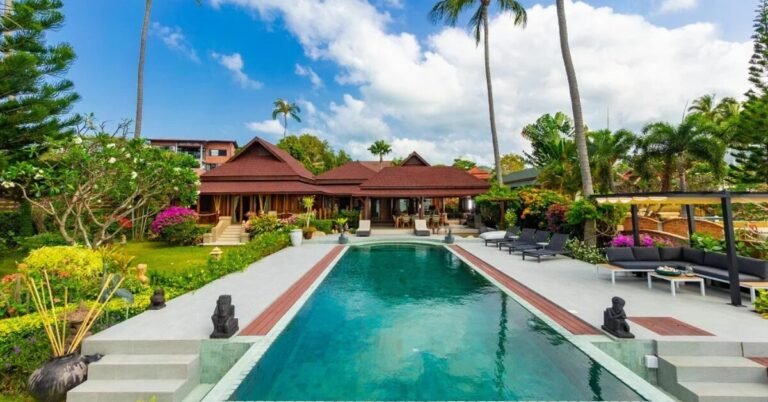As a foreigner, you can explore various legal methods to acquire property on the island, allowing you to either purchase a residence or engage in renting.
Although the process may differ from acquiring land in your home country, it opens the door for you to have your own stunning apartment or villa.
A. Is it possible for foreigners to purchase a house in Koh Samui?
Yes. While Thailand restricts foreign ownership of land, there are alternative avenues to fulfill your dream of owning property in Koh Samui.
As a foreigner, you can explore various legal methods to acquire property on the island, allowing you to either purchase a residence or engage in renting. Although the process may differ from acquiring land in your home country, it opens the door for you to have your own stunning apartment or villa.
To navigate this, familiarize yourself with specific ownership methods tailored for foreign buyers.
Additionally, it’s essential to acquaint yourself with Thai land measurement units such as “rai,” “ngan,” and “talangwah,” where 1 wah equals 4 square meters, 1 ngan equals 100 wah or 400 square meters, and 1 rai equals 4 ngan or 400 wah or 1,600 square meters.
Three seasons properties is here to help you all along the process of purchasing a property in thailand.
B. What are the prime locations to invest in property on Koh Samui?
Koh Samui boasts several top-notch areas for villa purchases or visits, each offering its unique charm and attractions.
Bophut – Plai Laem – Choen Mon:
- Perfect for families seeking a permanent residence.
- Affordable housing and apartments in a charming beach town setting.
- Immersive local culture and a family-friendly environment.
Chaweng:
- Main tourist hub famous for vibrant nightlif and sandy beaches.
- Abundance of beach bars and diverse property options.
- Ideal for those seeking a lively atmosphere, shopping, fine dining, and regular festivities.
Choeng Mon:
- Upscale area known for its quality beach and high-end villas.
- Offers complete amenities and a sophisticated living experience.
Maenam to Bangpor:
- Renowned for affordable tours and vacations.
- Ideal for tourists interested in popular tours and hikes favored by adventurous backpackers.
- Offers a mix of adventure and affordability for an enjoyable stay.
Lamai:
- Perfect for families seeking a permanent residence and international school.
- Affordable housing and apartments in a charming beach town setting.
- Immersive local culture and a family-friendly environment.
Taling Ngam – Lipa Noi – South of Koh Samui:
- Noted for its untouched natural beauty.
- Residents experience a simpler provincial life, away from the typical touristy scene.
- Closest proximity to nature for those seeking a serene lifestyle.
These locations cater to different preferences, ensuring a diverse range of options for those looking to invest in Koh Samui.
Three seasons properties is here to help you to choose the best area depending on your way of life you are looking for.
C. Koh Samui Property: Off-Plan vs. Resale – Making the Right Choice
Choosing between off-plan properties and resale properties in Koh Samui involves considering the inherent advantages and disadvantages of each option. The decision ultimately depends on your financial preferences and objectives as a buyer.
Off-Plan Properties:
An off-plan property typically starts as an empty lot or undeveloped land, marketed to real estate developers and early adopters of new projects. Investing in off-plan properties offers significant advantages compared to completed resale properties.
- Investment Opportunities: Building from scratch aligns with your plans and goals, presenting excellent investment potential.
- Early Price Lock: Securing an early price may lead to capital appreciation on the land’s value.
- Customization: Tailoring the property to your specifications.
- Higher Rental Yields: Potential for increased rental returns.
For off plan villa, it is very important that the agent recommend you a good developer and a good builder that you can trust. Ask your personnel real estate agent.
Resale Properties
A resale property refers to a previously owned property sold to another buyer. This can include existing residences, villas, condominiums, or apartments.
- Diverse Options: In a resale context, you have a range of options, from move-in ready homes to properties needing renovation or even demolition.
- Immediate Use: Purchase a property that fits your requirements without the need for new construction.
Ultimately, choosing off-plan or resale depends on your preferences – whether you seek the immediate use and cost savings of resale properties or the investment potential and customization offered by off-plan developments.
Three seasons properties is here to help you to choose the best option and the best property.
D. Is investing in property on Koh Samui a sound decision?
Absolutely. Koh Samui isn’t just a sought-after destination for tourists; its real estate market is witnessing a steady increase in value.
For those with the means, purchasing and renting out property on the island proves to be a lucrative venture, capitalizing on the constant influx of tourists from around the globe.
Beyond being a high-yield investment, Koh Samui presents an opportunity to secure a retirement home in the midst of Southeast Asian paradise. With well-established amenities such as hospitals, groceries, shopping malls, cinemas, international schools, and accessible transportation, Koh Samui offers a comprehensive living experience.
In essence, investing in property on Koh Samui not only promises financial returns but also provides the prospect of a tranquil retirement amid the beauty of Southeast Asia.
E. Property purchasers in Thailand have various choices for ownership
Ownership through a Thai Limited Company
A prevalent choice where a Thai limited company, established by the foreign buyer, acquires the property on their behalf.
The company, however, must have a majority of its shareholders (at least 51 percent) as Thai citizens, while the remaining share can be held by foreigners.
You will be the director of the Thai limited company. The land will be in the Thai limited company. the house can be in personal name or inside Thai limited company (if the villa in inside the company, you will not have to pay the 6.5% maximum transfer fees on the house value when you will ressell your property).
30 + 30 Leasehold Arrangement
This arrangement allows for leasing land in Thailand for an initial 30-year period, providing ownership of any structures erected on it.
The lease can be extended once or sometimes twice, permitting a maximum of 90 years of leasehold ownership.
Some lease are only for 30 years. But the selling price of the property will be lower.
It can be interesting if you want to invest less money in thailand.
Freehold Ownership
Grants absolute ownership of real property with no time limitations.
Foreigners can secure freehold ownership through:
- Condominium Title: Possessing a condominium unit.
- Freehold Acquisition: Procuring property through a company representing the interests of the foreign buyer.
Marriage Property Ownership
Involves joint ownership by marrying a Thai citizen.
The Thai citizen spouse and the foreign buyer jointly own the property and land through the institution of marriage.
Each option has its own set of legal prerequisites and consequences, and the selection depends on the buyer’s preferences, long-term plans, and adherence to Thai property laws. Seeking professional legal advice is recommended to navigate these ownership options effectively.
F. Creating a Thai limited company involves several key steps.
Preparation and Documentation:
- Identify directors and shareholders. You’ll need a minimum of 3 shareholders, along with 1 director to initiate the registration process.
- The director can be foreigner.
- Your personal Lawyer will open a new company if the villa you want to purchase do not have already an existing company.
Ask your lawyer for more details please.
G. What are the expenses associated with the acquisition of a property in Koh Samui?
Each property comes with its own set of costs, with smaller bungalows carrying different price tags than expansive beachfront villas.
Here’s a breakdown of costs in various price ranges:
- Small bungalows typically range from ฿3 to ฿5 million ($85K to $140K).
- Garden-view villas with pools generally cost between ฿6 to ฿15 million ($170K to $430K).
- Sea-view villas with pools fall in the range of ฿12 to ฿50 million ($340K to $1.4M).
- Beachfront villas, due to high demand and increasing beachfront prices, can surpass ฿20 to ฿200 million ($550K to $6M).
Condominiums and apartments are also available in Northeast Koh Samui, with 30 sqm units starting at ฿3 million ($85,000).
For those considering land plots, it’s crucial to consult with your personal agent and with a lawyer to determine the land’s zoning designation, incurring additional legal fees from the outset. Three seasons properties is here to help you to choose the best property.
H. Bank loan
It is very difficult or nearly impossible to get a loan in Thailand or in Europe to invest in Thailand. Please see with your bank for more information about a loan.














